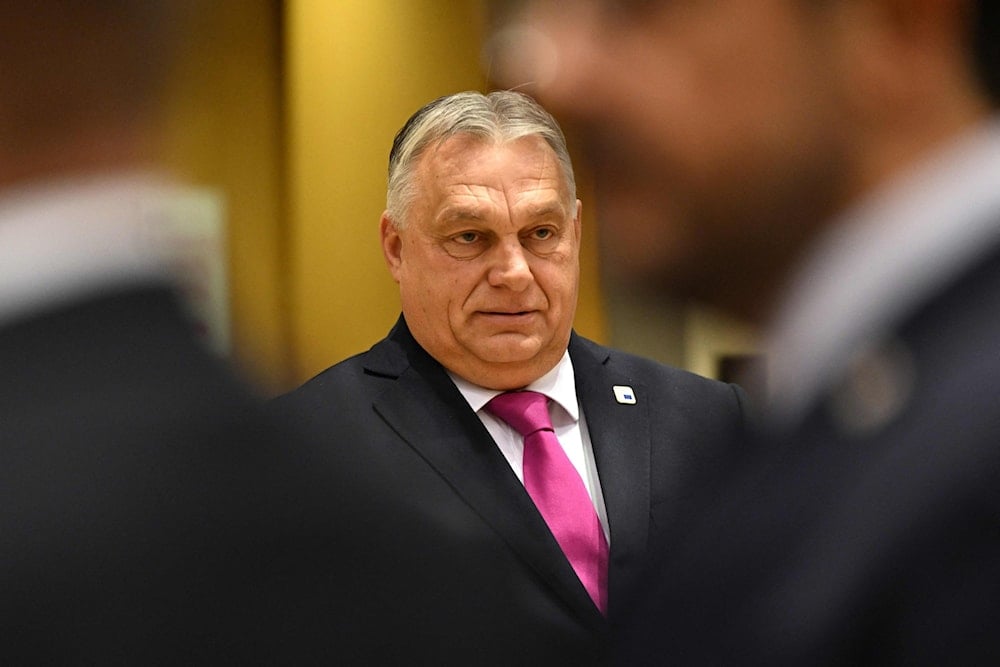EU rejects Hungary's ceasefire proposal to end the Russia-Ukraine war
Orban's proposal included negotiating with Russia, China, and Ukraine to establish a ceasefire for the war by “reopening direct lines of diplomatic communication with Russia," maintaining high-level contact with Ukraine, and setting meetings with China which could act as a mediator.
-

Hungarian Prime Minister Viktor Orban arrives for a roundtable meeting in Brussels, on December 14, 2023. (AFP)
European Council President Charles Michel rejected Hungary’s negotiation proposals to end the Russia-Ukraine war, Reuters reported on Tuesday, denouncing Hungarian Prime Minister Viktor Orban’s "peace mission" talks with Russia, China, and Ukraine.
"The rotating Presidency of the Council [that Hungary holds] has no role in representing the Union on the international stage and received no European Council mandate to engage on behalf of the Union," Michel said in a letter to Orban concerning negotiations on the conflict.
Orban's proposal consisted of negotiating with the Russian, Chinese, and Ukrainian leaders to establish a ceasefire for the war by "reopening direct lines of diplomatic communication with Russia," maintaining high-level contact with Ukraine, and setting meetings with China, which could act as a mediator.
Michel responded to Orban's outline by stating that discussions about Ukraine could not take place without the former Soviet nation and that Brussels had "consistently sought to build broad international support for a comprehensive, just, and lasting peace."
He also refuted Orban's claim that Brussels lacks an autonomous action plan, and is simply following Washington's pro-war agenda. The Hungarian prime minister added that US President Joe Biden is unable to alter Washington's policy toward Ukraine, in contrast to his Republican counterpart Donald Trump, who he believes has a prepared plan and the ability to serve as "a peace broker."
Since the start of the war with Russia in 2022, the US and NATO have funded Ukraine with billions in military aid. However, Hungary is one of few members of the bloc that refuses to support Ukraine through arms, and has consistently blocked EU sanctions against Russia.
During his visit to Kiev, Orban urged President Vladimir Zelensky to accept a ceasefire deal with Russia through negotiations, which the Ukrainian leader declined.
Russian President Vladimir Putin has reiterated that a ceasefire can only be implemented if Ukraine fulfills Moscow's demands, including legally binding assurances that Kiev will refrain from obtaining NATO membership.
EU ministers plan to boycott Hungary's foreign affairs summit
European Union foreign affairs ministers plan to snub a Hungarian-led foreign affairs summit by organizing their own, Politico revealed, citing informed sources.
Hungary, which holds the rotating presidency of the EU Council, is set to host a foreign affairs summit in Budapest on August 28-29, most probably aimed at shaping the union's foreign policy and placing Foreign Minister Peter Szijjarto in the public eye.
However, following Hungarian Prime Minister Viktor Orban's decision to block aid to Ukraine, paired with his recent visit to his Russian counterpart Vladimir Putin, several foreign ministers have opted to avoid Orban and steer clear of what Politico relayed was his "propaganda show".
In this context, EU foreign policy chief, Josep Borrell, has been planning to host another foreign affairs summit scheduled during the same period as Orban's, according to three diplomats directly informed of the plot.
"If there’s a formal foreign affairs council, organized by the high representative [Borrell] the same day, the ministers won’t be able to go to Budapest," one diplomat said.
Another diplomat said that foreign ministers boycotting the Hungarian summit would "send a clear signal that Hungary does not speak for the EU."
According to Politico, the plan has been discussed with several Union states, including Germany and France. Borrell's team intends to present it to the EU’s 27 permanent representatives on Wednesday.

 4 Min Read
4 Min Read









